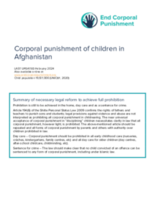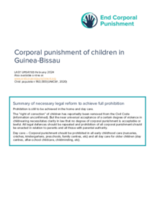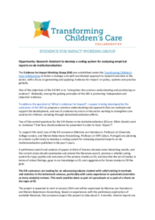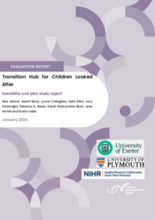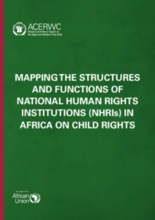Displaying 551 - 560 of 14575
This is a corporal punishment country report for Afghanistan. In Afghanistan, the Law on Protection of Child Rights 2019 prohibits corporal punishment in alternative care settings and in penal institutions.
This is a corporal punishment country report for Guinea-Bissau. While prohibition of corporal punishment is still to be achieved in the home and day care, the Child Protection Code 2021 of Guinea-Bissau prohibits corporal punishment in alternative care settings, schools and in penal institutions.
Family for Every Child launched its global inter-agency guidance on supporting kinship care aimed at policy makers and programme managers during this webinar on 1 February 2024.
The special issue accepts research on traditional and non-traditional ACEs worldwide, which broadens our understanding of risk and protective ecological factors shaping health outcomes.
Born amid the horrors of the war in Gaza, the month-old baby girl lying in an incubator has never known a parent's embrace. She was delivered by Caesarean section after her mother, Hanna, was crushed in an Israeli air strike. Hanna did not live to name her daughter.
The Evidence for Impact Working Group convenors are looking for an advanced graduate student with solid training in methods and statistics in the behavioral sciences, preferably with some experience in systematic (narrative or meta-analytic) reviews. This work could be done as part of a practicum or as part of a thesis on the topic of de-institutionalization.
Faith to Action has developed a 3-day in-person event for U.S.-based organizations serving orphaned and vulnerable children around the world. The purpose of this event is to enhance your learning and connections in the journey of transitioning from residential care to family-based care.
The first-ever National Kinship Care Strategy has been published. This session aims to explore the implications of the strategy on social work with kinship families and the impact it has on local authority planning, practice and workforce. The panel event will take place online via zoom on Tuesday 30th January 11.30am – 1.30pm.
This is a feasibility and pilot evaluation of the Transition Hub -- a multi-disciplinary team which aims to support young people aged 11 to 17 who are making the transition into care or experiencing a placement transition in England. The feasibility phase explored the feasibility of delivery and aimed to provide lessons for further research. The pilot phase examined whether the Transition Hub might evidence promise on desired outcomes and sought to offer further learning about delivery and acceptability.
ACERWC released a study on the structures and functions of NHRIs on child protection to assess how child rights issues are incorporated in their mandates. The study identifies challenges and proposes areas to strengthen collaboration.

